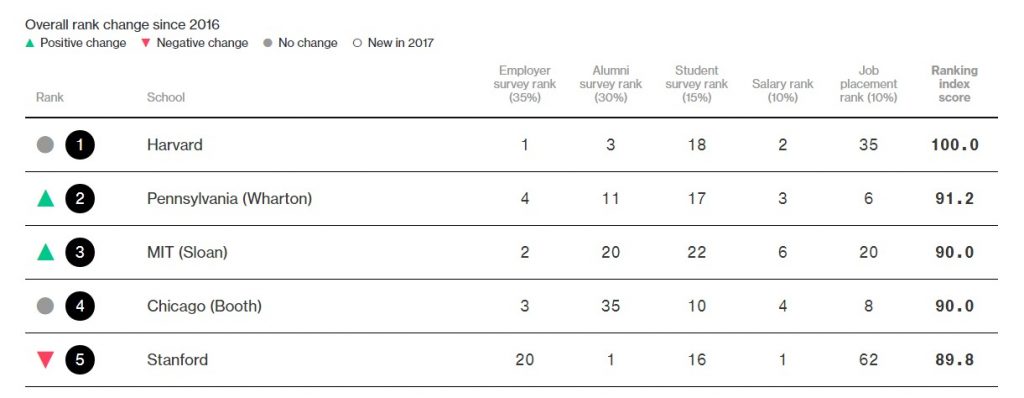2018 Trends: How Much Can You Get Out of a Boston MBA?

Boston, the largest city in New England, is often considered the academic, economic, and cultural center of the Northeastern United States. Beantown is also considered one of top college towns in the country thanks to its numerous esteem colleges and universities. Lots of that talent sticks too: Forbes ranks the city as one of the best places for business and careers. Continue reading…
Harvard Business School Tops Bloomberg Businessweek Ranking

For the third straight year, Harvard Business School reigned supreme in the annual Bloomberg Businessweek “Best Business Schools” ranking, topping the Wharton School at the University of Pennsylvania and MIT Sloan School of Management. In joining HBS on the medals podium this year, those schools both saw significant gains over last year, climbing from sixth and seventh respectively.
Rounding out the top five this year is the University of Chicago Booth School of Business —holding steady year over year at fourth—and Stanford Graduate School of Business, which fell from second place in 2016 to fifth this year.

The methodology Bloomberg Businessweek uses to arrive at its annual MBA ranking involves weighting each of five principle factors. Employer surveys account for 35 percent of a school’s score. Alumni surveys account for another 30 percent. And a combination of current student surveys, salary rankings, and job placement together account for the remaining 35 percent of the final score.
High Risers
Ten out of the top 20 ranked schools in the 2017 Bloomberg Businessweek ranking advanced at least one spot over last year. Wharton and Sloan each managed to leap four spots, boosted by high praise from employers and hefty salary benefits for recent graduates. The University of Washington Foster School of Business also managed to jump from 19th to 15th overall this year, thanks largely to its top ranking as the nation’s best business school for job placement.
The Cornell S.C. Johnson Graduate School of Management and the UCLA Anderson School of Management both saw a rankings jump of three spots, with Johnson moving up to 13th and Anderson coming in at 19th.
The year’s biggest winner, however, may be the Penn State Smeal College of Business, which jumped a whopping 12 spots from last year’s 37th to come in at 25th in 2017. It wins the award for the year’s biggest overall rankings increase. The USC Marshall School of Business also saw a momentous climb this year, sidling up eight spots from 38th last year to 30th this year.
In the latter half of the rankings came another one of this year’s biggest risers, with the Terry College of Business at the University of Georgia jumping 11 spots from last year, up from 65th overall to 54th. Elsewhere, the David Eccles School of Business at the University of Utah, the Whitman School of Management at Syracuse University, the C.T. Bauer College of Business at the University of Houston, and the Pepperdine University Graziadio School of Business and Management all saw a jump of at least seven spots in the new ranking.
Once Mighty, Now Fallen
Stanford GSB, Duke’s Fuqua School of Business, Dartmouth’s Tuck School of Business, and Jones School of Business at Rice University may all be feeling a wee bit dizzy. Last year Stanford shot up to second from seventh the year before, but this year it finds itself demoted to fifth. Duke’s Fuqua School, which last year celebrated a momentous jump from eighth to third, this year fell back down to seventh. Dartmouth’s Tuck School of Business, which had one of last year’s biggest gains, rocketing up nine spots to break into the top five from a mere 14th place finish the year before, this year finds itself at seventh. Similarly, Rice Business, as the Jones School likes to be called, which last year catapulted 11 spots to number eight, this year slipped to tenth. But at least all maintained their footing within the top 10.
Emory’s Goizueta Business School and the Texas A&M Mays Business School, for their part, slipped out of the top 20 altogether. Goizueta slipped just slightly, from 20th to 21st, and Mays slid from 18th to 22nd. The University of Virginia Darden School of Business also stumbled, slipping from 12th last year to 17th this year. But the Charlottesville school at least managed to remain in the top 20, thanks in part to strong scores in the student survey and salary categories.
No school, however, lost more ground than the George Washington University School of Business, which fell an eye-popping 14 spots from last year, losing its place among the top 50 business schools in the United States.
Bloomberg BW has made multiple changes to its methodology in recent years, resulting in significant volatility in terms of where schools fall on the list even when not much has changed year over year at the individual schools themselves. This has led many to question the credibility of the ranking overall. That said, Clear Admit’s Alex Brown found this year’s results easier to swallow than some in recent years. “This ranking seems more reasonable to me this year,” he says. “Each of the M7 programs are in the top 10, and the schools I would consider in the top 16 are all in the top 20.”
You can view the complete 2017 Bloomberg Businessweek rankings here.
This article has been edited and republished with permissions from Clear Admit.
MIT Sloan Looks at What Businesses Need to Address Sustainability

The introduction and advancement of sustainable practices in industries like biopharmaceuticals, IT, and energy, has already turned into increased profits, as well as a boost in talent in recruitment. Rebecca Linke from MIT Sloan looked deeper into the changes and why more are needed soon.
MIT Professor Talks Disruptive Potential of Self-Driving Cars

Few modern incarnations have such a high-level of disruption than self-driving cars. MIT Sloan recently took a look at the potential impact.
Last month, the House passed the “Self Drive Act,” which establishes a “federal framework for regulating self-driving cars.” This legislation permits 25,000 self-driving cars on the road annually between now and 2020, followed by 100,000 per year after that.
Sloan professor David Keith, whose research explores emerging automotive technologies, says self-driving cars have “the potential to change the whole paradigm of vehicle ownership.”
According to Fortune, most cars are parked 95 percent of the day. Shared self-driving cars would save car-less consumers money, create less congestion on the roads, reduce commute times, and offer mobility for folks who otherwise can’t drive—“teenagers; people who are sick; those who have lost their license; and the elderly.”
As job opportunities open up for people as a direct result of self-driving cars, it’s likely the ubiquity of autonomous vehicles will put bus drivers, as well as the 3.5 million truck drivers, out of work. Keith puts an optimistic spin on the development, believing there is still a need for human involvement, “whether it is for loading and unloading freight on trucks or ensuring the safety and comfort of passengers on buses.”
The article points out that the House will impose minimal oversight on self-driving car manufacturers due to the fact that autonomous vehicles will significantly reduce the number of motor accidents, which topped 40,000 in 2016, according to the New York Times. Autopilot-activated Teslas reduced the likelihood of crashes by 40 percent, according to data.
Keith concludes, “To ensure that self-driving cars can reliably make good decisions, even in situations they’ve never before encountered, we need to get more self-driving cars on the road.
Zipcar Founder and MIT Sloan Grad Robin Chase Offers Entrepreneur Advice

Last month, Zipcar founder and “Peers Inc” author Robin Chase, ‘86, spoke at MIT Sloan‘s Women in Management’s Push for Parity Week, offering three incredibly valuable lessons to those in attendance.
Which Boston MBA Programs Offer the Best Return on Investment?

A stellar résumé, well-targeted recommendation letters, and a strong GMAT score may be vital in earning a spot in your dream business school, but one factor that may weight heavier than everything else is the return on investment. Will the school be worth it? How successful are its alumni? How do employers feel about the school name on a diploma?
A person needs to know that their time—and money—will amount to success and a well-paying job. If Boston‘s the city for you, here are the top four business schools if return on investment, or ROI for short, is on your mind.
#1) Harvard Business School
This prestigious university might come as no surprise as first on our list. But it’s not at the top for nothing. Home of one of the world’s first MBA programs, Harvard Business School is a bit separate from the main campus itself in Cambridge, sitting in Boston’s Allston neighborhood.
Unsurprisingly, the program’s ROI is highly-competitive. Tuition at HBS currently costs around $72,000. That’s a lot more than how much a student might pay per year elsewhere, even without considering the usually stellar track record of HBS grads. Graduates in 2016 had median base salaries of $135,000 with a median signing bonus of $25,000. Sixty-eight percent received a signing bonus. That’s a lot of people. And it’s a pretty sure thing. Work hard at Harvard, and it appears you’re sure to reap the benefits.
READ MORE: HBS Announces Largest-Ever Scholarship Donation
#2) Sloan School of Management – MIT
At MIT’s Sloan School of Management, students can feel certain they’ll succeed after graduation. Individuals, of course, may determine their own success, but Sloan knows how to get its students there. The school is known for its business offerings, particularly its global Sloan Fellows program. There, students can walk away with an executive MBA in just one year. Sloan has been growing its educational base since 1914 when its “Engineering Administration” course set a business tone in the technical school.
Currently, tuition at MIT Sloan sits at $71,000, which isn’t much less than Harvard’s. The median base salary for 2016 graduates was $125,000, with salary ranging anywhere from $40,000 to $200,000.
The business school can provide a myriad of opportunities, especially through its various centers and initiatives, which focus on, science, innovation, medical research, and more.
#3) D’Amore-McKim School of Business – Northeastern University
This business school is tucked in Boston’s arts neighborhood, the Fenway Cultural District. Northeastern University offers multiple campuses, but the MBA programs take place at the D’Amore-McKim School of Business.
MBA students pay the same tuition for classes online or in person: $1,560 per credit hour. For a year, that’s roughly $28,080—significantly less than the aforementioned Harvard and MIT. So if you’re not ready or can’t afford to drop a bunch of money on costs, D’Amore-McKim might be the program for you. Its graduates go on to make $81,000 a year, which is nearly 66 percent more than yearly tuition. The top base salary for recent alumni is $115,000.
These employment opportunities come quickly: 96 percent of D’Amore-McKim alumni accept a job offer within three months of graduation.Companies like Zipcar and Hasbro, Inc., hired graduates last year. Resources like the Graduate Career Center and the school’s clubs can help students make it. Clubs like the Emerging Markets Club gives students the hands-on experience they need to succeed.
#4) Questrom School of Business – Boston University
The Questrom School of Business at Boston University offers a variety of MBA programs. The first was launched in 1925, but the school went on to add an executive MBA, public and nonprofit MBAs, evening MBAs, and health sector MBAs.
A full-time MBA tuition costs $51,916 at Boston University. The prices vary depending on which program a student decides is right for them, which contributes to the school’s placement on the list. For example, the executive MBA costs nearly double the traditional MBA rate. However, alumni do go on to make that money back. In 2016, graduates’ mean base salary was $100,820. About 92 percent of graduates accepted a job offer just three months after earning a degree, with nearly all taking an internship. Places like General Motors and IBM hired recently hired Questrom grads.
You could be next. But it’s up to you to decide what school makes the most sense for you. You’re onto something with Boston though. The seafood will never end, and the accents will always entertain. Find the city’s best executive MBA program or explore its one-year MBAs if you need just a little bit more info.
